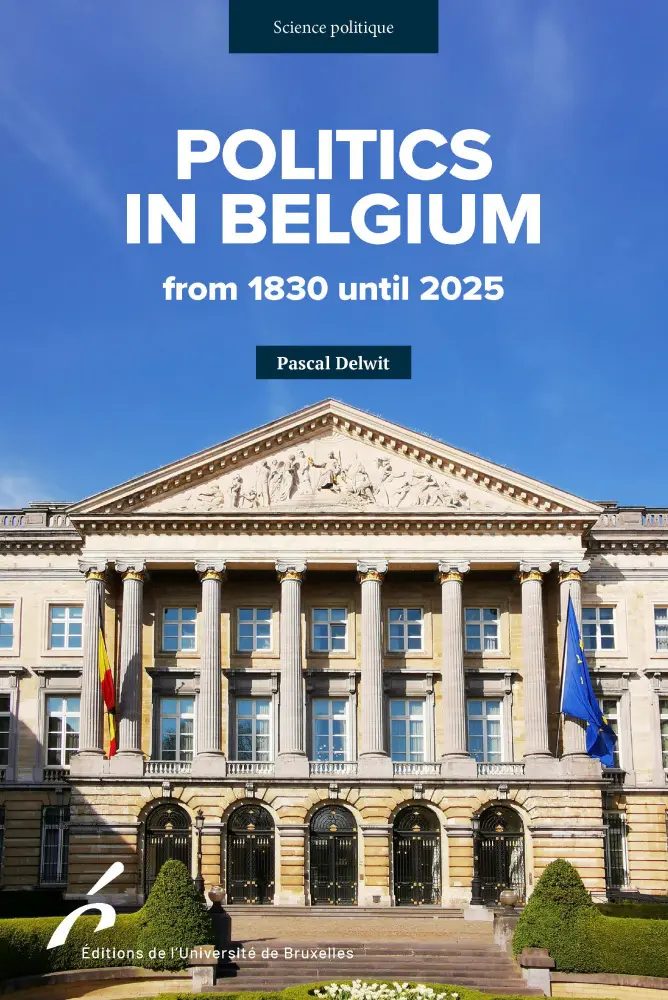Politics in Belgium from 1830 until 2025
Pascal DELWIT
Availability: Out of stock - available in 8 open days
- Categories: Belgique, Belgique
- Publisher: ULB Editions - EDITIONS DE L'UNIVERSITE LIBRE DE BRUXELLES
- ISBN: 9782800419237
- Publication Date: 03/07/2025
- Binding: Paperback
- Number of pages: 458
Table of contents
Introduction
Chapter I - The Beginnings of the Belgian State
A territory under trusteeship
The union of the Northern and Southern provinces
The advent of Belgium
Chapter II - 1830-1893: From Unionism to Bipartisan Confrontation, Liberals vs Catholics
Unionism
A striking industrial and economic development
Asymmetrical unionism
Catholics vs Liberals
Liberal crystallisation
Building the Catholic Party
The language issue: the beginnings of the centre-periphery cleavage
Chapter III - 1893-1918: The Birth of a Multi-Party System
The crystallisation of the socio-economic cleavage
The rise of the socialist world: the Belgian Workers' Party - (Parti ouvrier belge-Belgische Werkliedenpartij, POB-BWP)
Opening up the political system: the advent of universal male suffrage with plural voting
1894: a political turning point
The advent of proportional representation
The beginnings of pillarisation in Belgium
Changing the world: the socialist pillar
At the service of God and His people: the Catholic pillar
Shattering the absolute majority: the final convulsions of Catholic dominance
Belgium, a colonial power
The 1914-1918 war and its consequences
Chapter IV - 1919-1946: The Fall of the Catholic Party Hegemony and the Rise of a New Kind of Multiparty System
Belgium's evolving status in post-World War I international relations
Redefining industrial relations
Towards linguistic equality?
Changes in political life
The development of the socialist pillar
A new challenger: the Communist Party of Belgium (PCB-KPB)
Farewell to Catholic hegemony
The rise of the Flemish political movement: from the Frontpartij to the Vlaams Nationaal Verbond (VNV)
Rediscovering Christ the King? The brief rise of Rex
The new status of Belgian liberalism: a 'support’ party for Catholics
Pre-war turmoil
Chapter V - 1944-1961: Fifteen Years of a Two-and-Half-Party System
Is change always pursued for its intrinsic value?
Changes in the social security system
From the Catholic Bloc to the Parti social-chrétien-Christelijke Volkspartij (Social Christian Party)
The aborted experiment of the Belgian Democratic Union
From the Workers’ Party to the Belgian Socialist Party
The Communist Party’s short-lived heyday
The Liberal Party’s new role
A long history of philosophical polarisation: from the Royal Question to the school wars
The Royal Question
Ruthless school wars
The end of a colonial power
Chapter VI - The New Openness of the Party System
The new salience of the socio-economic and linguistic cleavages
From the winter strike of 1960-1961 to Flemish socio-economic predominance
Two main languages, two countries?
Liberal realignment: building a conservative party
A delicate transition for the socialist movement
The emergence of regional parties in Belgium: the Volksunie, the FDF, and the Rassemblement wallon
From the Vlaamse Concentratie to the Volksunie
From the PWT to the Rassemblement wallon
Building the FDF
Further broadening of the party system
Communist schism and new demands
Challenging a traditional pattern
The 'Leuven Affair’, or the breakup of the PSC-CVP
The implosion of the Liberal Family
The new socialist path: uniting progressives?
The first state reform
Dissolution of the Rassemblement wallon
From the failure of the Egmont Pact to the laws of August 1980
The Volksunie is in turmoil
Surfing the neoliberal wave
Liberal comeback in the spotlight
A Social Christian family under stress
Further decentralisation: the long labour of the third reform of the state
Socialist reorientation
New cleavages, newcomers
The short-lived UDRT-RAD
The upsurge of green parties: Ecolo and Agalev
Belgium through the prism of the new Radical Right
Farewell to the Communist Party
The existential questions of the Volksunie
Repositioning the FDF
The advent of federalism and the painful 1990s in Belgium
Chapter VII - Extreme Fragmentation, Extreme Governing Difficulty
1999: a new rupture-election
From missed opportunity to divine surprise: the evolution of the Flemish liberalism in the 1990s
The foundations of a long-anticipated new era: the Francophone liberals
An affected Social Christian world
From heaven to hell? Socialists facing challenges
The greens in government at last
Major advances in new generation rights
A fifth state reform
Tribulations of Flemish political nationalism
Mirage of bipolarism, explosion of multipartyism
Farewell to Flemish political Catholicism?
A sixth state reform by force
The rise of a national, ethnocentric, and conservative party: the N-VA
The false promise of Spirit
The failure of the liberal sorpasso
Vlaams Belang, like a phoenix
The brief Dedecker phenomenon
From sp.a to Vooruit: in search of lost socialism
Flemish greens hit the glass ceiling: from Agalev to Groen
Parti socialiste: farewell to dominance
Ecolo: off the rollercoaster
MR: the quest for the top spot
DéFI: in search of an identity
Failing of the French-speaking Radical Right
The elusive horizon of the Parti populaire
The uncertain future of the Centre démocrate humaniste and the surge of Les Engagés
Radical Left resurgence: PTB-PVDA back in the game
Chapter VII - Contemporary Changes in the Regime and Political System
The fragmentation of the political system in Belgium
Changes in electoral behaviour
Institutional constraints
The law on the state funding of political parties
Repeated changes in electoral law
The road to parity and diversity
The federal state, changes in parliamentary representation, and the impact on parties
A stalled negotiation process
Party leaders, more and less powerful
A new type of party: organisational changes in the world of political parties
Changes in institutional constraints
Personalisation and acceleration of communication time
The diminishing role of monarchy
Bibliography
